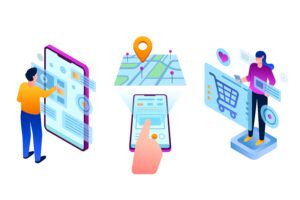Mobile applications are developed for two platforms. One is iOS, which is designed by Apple Inc., and the other one is Android by Google LLC. Both platforms serve a decent percentage of global users over the years.
Key benefits of both platforms
Android:
- Flexibility: Android is flexible because of the open-source feature which allows customization within the user interface and beyond.
- Bigger crowd: Android is free of cost; hence it has become popular among developing countries within Asia, and South America. As a result, they have bigger market shares in these regions.
- Design Principles: Programmers can conveniently develop an elegant User Interface through Google design instructions.
- Wide range of options: Android’s open source platform allows developers to put in a wide range of applications within Google Play. Thus, users can have multiple applications for specific needs.
iOS:
- Target Consumers: iOS applications or devices belong to a premium price segment. Hence, Apple targets the developed countries in Europe and North America to generate higher profit margin.
- Lower Cost: As the development process of iOS apps is comparatively easy, it helps the company to reduce costs and earn more.
- Profitability of the Market: iOS users spend three to four times more money as compared to Android users due to the pricing and positioning of Apple. This opens a path for the developers to earn more through launching new apps in the iOS platforms.
- Rugged Security: iOS is well-known for its security within the platform, as it requires a verification process to be posted to the App Store. This process secures the entire system and protects user data.
Difference Between Android Apps vs iOS Apps Development
Android app development is the process of creating applications for the Android Operating System-based smartphones and tablets. On the other hand, iOS app development is for Apple iOS-based phones and tablets (iPhone, iPad). The growth and development of the app heavily relies on the platforms.
It can vary based on distinct factors, as seen below.
Programming Language
Android apps are developed through Java, and another known programming language called Kotlin. Furthermore, developers can code most of the application logic in C or C++ using Android NDK for improved overall performance, especially for intensive use such as gaming and video calling.
iOS apps are mostly designed in Objective-C language which is based on C and C++ languages. Developers also use Swift and Flutter for iOS applications.
App Development Tools
Android possesses an open development platform that also endorses third-party apps and tools. It is a good thing for developers as it means they can experiment with various features and add more functionalities to their applications.
Apple also has its own application development platform, but with a limited set of tools. Developers can use external tools for app development, but it restricts them from experimenting.
Complexity of the Process
The Android OS is used across devices of different build and development needs, but iOS is utilized only on Apple devices and follow the same architecture. iOS app development is easier compared to Android apps– with a catch. iOS is restricted, as an Apple device is necessary to code for iOS, whereas Android does not have such restrictions.
Multitasking
Apple’s app development platform is unique and stable with specific tools and restrictions, and Android is the polar opposite. Multitasking is easier on Android and comparatively difficult on iOS.
App Development Time and Cost
Due to the vast variety of devices and their screen sizes, Android application development usually takes more time whereas iOS developers create applications only for their own platform; and the hardware optimization on iOS devices is excellent which omits the risk of less optimized codes.
The development cost depends on few factors such as a number of devices, used labor, programming methods and more.
Cost can vary. App development can be expensive or cheaper based on hourly rates (as it varies from region to region) and time spent on design, development, and testing. App Store is full of restrictions, whereas Google Play Store provides the freedom of uploading applications.
Android Studio can efficiently generate multiple versions of apps for various devices and offers a flexible system. On the other hand, XCode contains a noble source editor. But it is superficial. Developers have their own preferences whichever platform they want to use because both have pros and cons.
Developer Platform
Both Android and iOS have corresponding platforms for their developers which provide them with various features, facilities, and current updates.
Android developers have Android Studio, Jetpack, Kotlin, docs and games. Likewise, Apple has Xcode, Xcode Cloud, Swift, TestFlight, Documentation etc.
Developers can also access user feedback through Google Play console, which allows users to rate, review and post feedback on any specific app. Apple has their own App Store Connect, Feedback assistant and Developer forums, through which they can receive feedback and bug reports.
Additionally, Apple has different programs for developers, enterprise programs for large and small businesses. They also host events such as App Store Awards and Apple Design Awards to encourage people involved in app development. Apple runs developer academies in several countries, including the U.S, South Korea, Italy, and Brazil.
App Publishing
Publishing apps in both Google Play and App Store is smooth. However, the key difference is the restriction in iOS and freedom in Android. One cannot easily publish any app in the App Store, whereas it is the opposite case with Android applications.
However, to dominate both platforms, developers often choose to create a single cross-platform development for applications despite two native products. Cross-platform development offers several benefits, as it reduces overall development cost, increases speed, provides unified interface for both Android and iOS, and enables higher audience reach.
It’s important to note that, in cross-platform development, the coding gets complex and there will be a shortage in terms of features and flexibility.
iOS vs Android: which is better?
The answer: It depends. Different project requirements are suited for different platforms. Businesses should define their goals and objectives first, then choose the platform. From a user perspective, it depends on the need of that specific user.
Issues with iOS and Android:
Android
Testing the Android apps and modifying them for cross-platform development can be costly due to its huge range of devices. Also, the app performance can be sluggish in the older device models.
Android users spend less money on apps. According to a survey, Google Play store only made $23.4 billion in consumer spending in the first half of 2021, which is very less compared to Apple’s App store. This is because many apps within the App Store are paid, whereas Play Store offers tons of free applications.
iOS
From a developer’s perspective, iOS app approval process is more critical than Android. It takes a while for an application to be approved due to security issues and irrelevancy or inconsistency.
Apple demands their app creators to follow their interface instructions, as it will make all iOS applications look sleek and clean, and have standardized behavior. However, Google permits more creativity and freedom in terms of interface design.
Hopefully, this app development overview helped you grasp the basics to take the most effective steps to achieve the goals you have. In the meantime, you are always welcome to get in touch to explore the opportunities to partner and collaborate with Technuf. Among our services, alongside cybersecurity, software development, business intelligence and more, you will also find mobile collaboration.


